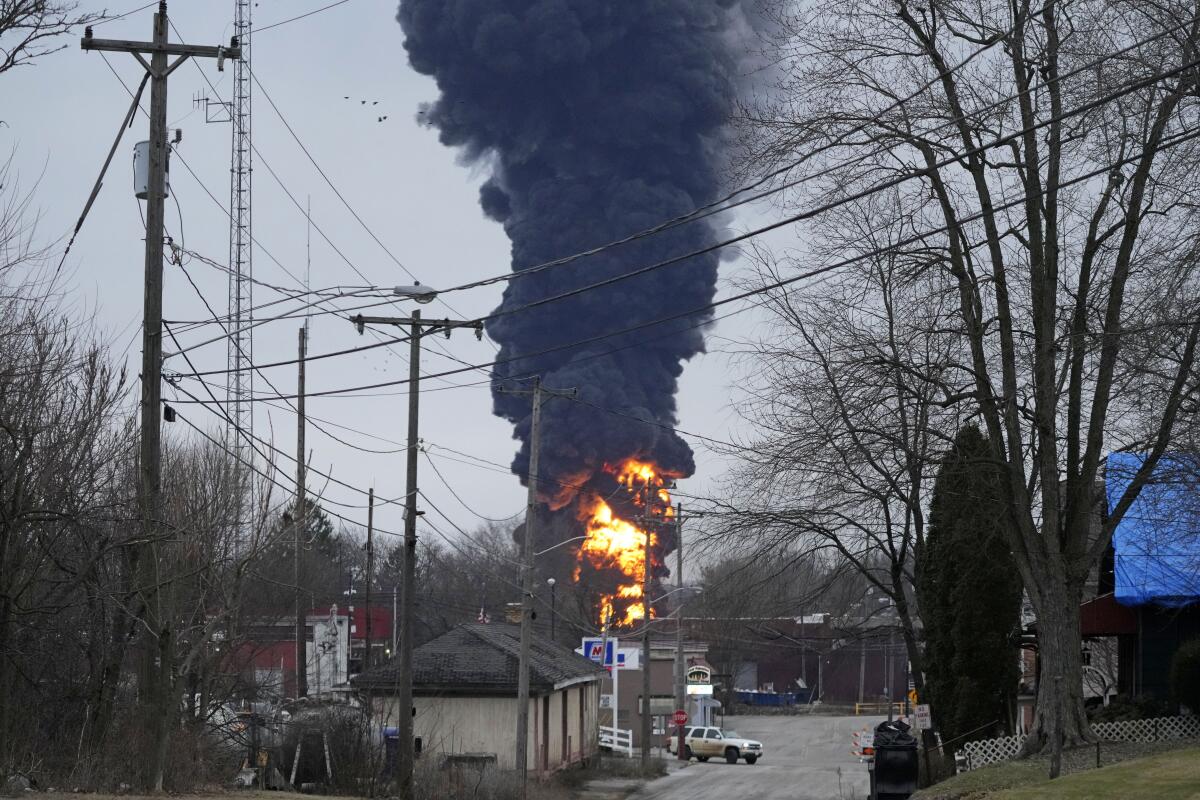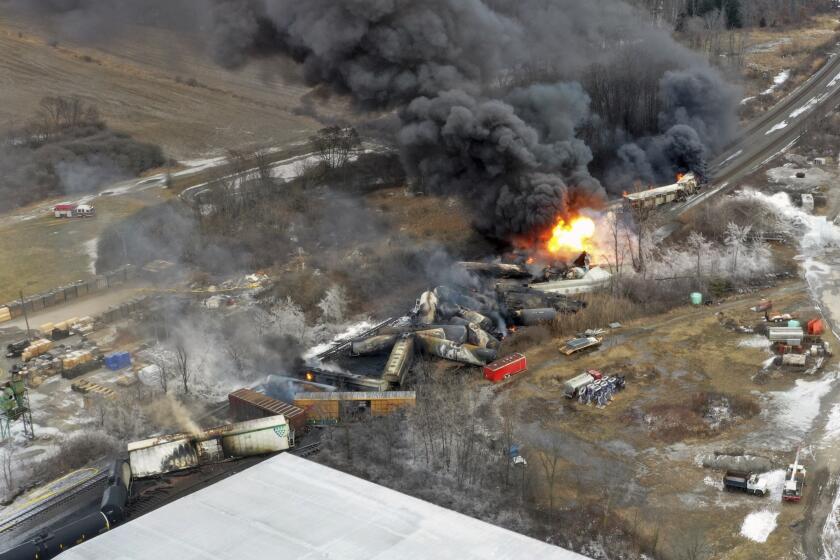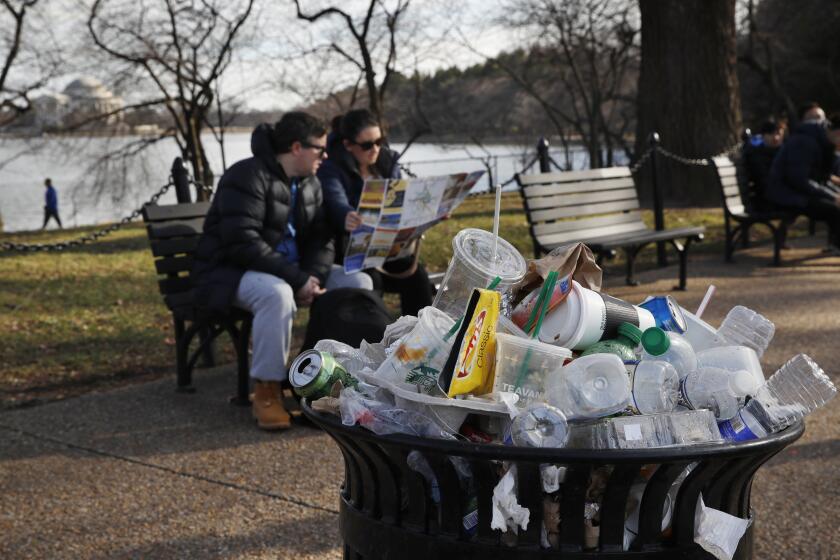Opinion: Another toxic train derailment will happen if we don’t rein in plastics

- Share via
Images of dead fish floating in murky water and menacing plumes of gray smoke are haunting the nation’s front pages. Interviews with distressed residents are interspersed with exasperated talking heads on our television screens. A month after the train derailment disaster in East Palestine, Ohio, America continues to bear witness to the community’s suffering.
Though any fiery train wreck is hazardous, this one was particularly catastrophic given the chemicals onboard. Chief among them was cancer-causing vinyl chloride gas, which officials intentionally released into the surrounding air to avoid an explosion. Residents were evacuated during this operation, but long-term pollution and exposure concerns remain. Just last week the Environmental Protection Agency ordered the railway to test the air for dioxins, which can also cause cancer and linger in the environment long after vinyl chloride and other plastic chemicals are burned.
Soon the camera crews will pack up and public attention will shift to the next big story. But for East Palestine, the story is just beginning, and the following chapters are likely to be grim. We know because the same chemical contaminated — and eventually destroyed — several towns in Louisiana decades ago.
Neglecting infrastructure that makes U.S. society function — like public transportation — endangers our ability to respond in the case of a disaster or attack.
Morrisonville, La., was founded after the Civil War by freedmen and blossomed into a vibrant, predominantly African American community. But in 1958, chemical giant Dow built a vinyl chloride plant near the river, displacing the town’s sugar and cotton plantations. Demand for PVC plastic — the main product manufactured with vinyl chloride — grew, and the plant further encroached on the community. As one resident put it to the Times-Picayune at the time, the plant was right “on top of us.” Blaring sirens warning of toxic releases soon became a part of daily life. During these events, residents were told to close windows and doors and huddle inside to avoid breathing in too much of the toxic fumes.
When environmental groups and the EPA started noticing increased diseases and dying fish in the 1980s, Dow made modest offers to buy residents out of their homes, often barely enough to buy or rent a new home. When residents refused, they faced pressure. If they didn’t take the offer, the company suggested, their property would soon become worthless because of the pollution. By the early 1990s, the town was entirely abandoned, save for a graveyard.
Reveilletown, La., was another bustling community built by formerly enslaved people and destroyed by the PVC plastics industry. A major manufacturer, Georgia Gulf, eventually overtook the town, spewing vinyl chloride and its byproducts into the air and water. The company razed the community, dispersing the residents far from one another — severing their common bonds, church memberships and any political cohesion they might otherwise have had. The residents of the town organized a candlelight vigil in 1989 in which “Black and white environmentalists mourned the death” of the community, according to former resident Janice Dickerson.
A similar fate befell Mossville, La. Vinyl chloride producers polluted the town and a decade ago began buying out residents when the toxic consequences were borne out.
Vinyl chloride production not only laid waste to these towns, but it also contributed to the surrounding region becoming known as “Cancer Alley.” The water, air and land in this area have become the sewers of America’s plastic and chemical industries. Seven of the 10 U.S. census tracts with the highest cancer risks from air toxics are in this area, according to a 2014 EPA analysis. The same analysis found that residents of one town are 50 times more likely than the average American to develop cancer from air pollution.
The legislation heads off what would be a costly and contentious ballot measure and pushes California ahead of the world in the fight against plastic waste.
The vinyl chloride emissions in East Palestine originated from a train carrying the chemical, rather than a plant’s smokestacks. As a result, most public scrutiny has focused on the Norfolk Southern Railway corporation and transportation agencies instead of the chemical industry. (A second Norfolk Southern train derailed in Ohio on Saturday, though officials say this crash involved no hazardous materials.) Improved railroad and chemical transport safety is undeniably crucial for preventing this type of disaster in the future.
However, it’s also important to look at the bigger picture. The East Palestine train was carrying this dangerous chemical in the first place because of a booming plastics industry that’s expanding to Ohio and other parts of Appalachia. What happened in Louisiana will happen elsewhere too unless swift action is taken.
PVC is ubiquitous, used in products as wide-ranging as toys and pipes. But it’s also very replaceable. Materials experts say that alternatives including glass, ceramics, linoleum and polyesters are feasible substitutes in most cases. That’s why it would be a common-sense move for the government to restrict all nonessential uses of PVC, giving way to a phaseout of vinyl chloride production.
PVC has already been banned in most food packaging in Canada and South Korea, and legislation to ban it has been floated in California. However, more comprehensive action is needed on PVC — and on the larger plastics crisis. Two months before the derailment, the United Nations kicked off negotiations for a global treaty to limit the production and use of plastic. The Ohio disaster is a stark reminder of plastic’s human costs and should energize calls to make this treaty as strong as possible.
Until then, vinyl chloride and plastics plants will continue to poison air and send toxic trains barreling across America’s railways. What’s at stake is the health of nearby residents, their communities and the environment. History has shown that this dirty industry risks turning even the liveliest small communities into ghost towns.
Rebecca Fuoco is the director of science communications at the Green Science Policy Institute. David Rosner, a professor of sociomedical sciences and history at Columbia, and Gerald Markowitz, a history professor at John Jay College of Criminal Justice, are the authors of “Deceit and Denial: The Deadly Politics of Industrial Pollution.”
More to Read
A cure for the common opinion
Get thought-provoking perspectives with our weekly newsletter.
You may occasionally receive promotional content from the Los Angeles Times.












